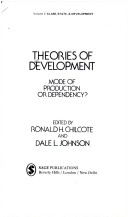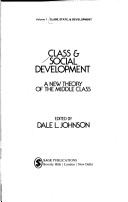Class and Social Development
3 total works
`Social scientists of many political persuasions will find this volume a provocative source of analysis on the historical, social and political roots of class relations and the development of the state in the Third World.′ -- Development Update, Vol 4 No 2, 1985
`This book succeeds admirably in its purpose. Each chapter is an interesting and theoretically sophisticated account of a concrete historical situation. The overall standard is impressively high′ -- Journal of Development Studies, 1986
`...specialists in Marxist class theory will find it covers most recent developments in analysis and is constructively self-critical.′ -- Reviewing Sociology, Vol 3, Issue 3, 1984


